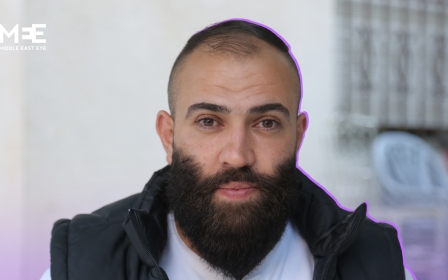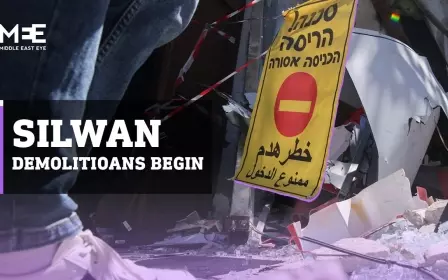Jerusalem: Palestinian man resists Israel order to self-demolish home
Nidal al-Rajabi stands in the beautifully decorated front yard in his home in the al-Bustan neighbourhood of the Palestinian town of Silwan.
Surrounded by plants and soft furnishings, Rajabi, 45, specialised in the details of the interior and exterior design of his home, paying special attention to the front yard where all the family festivities took place.
Now Rajabi has been given 21 days' notice by Israeli authorities to either demolish his own home, or vacate it and let the municipality knock it down.
It was only three months ago that Rajabi's commercial store, adjacent to his house, was demolished by authorities, also under the pretext that it had been built without a permit.
Speaking from his home, in an area nestled on the outskirts of Jerusalem's Old City, to the south of Al-Aqsa Mosque, Rajabi describes where he lives with his family of seven as his "paradise".
New MEE newsletter: Jerusalem Dispatch
Sign up to get the latest insights and analysis on Israel-Palestine, alongside Turkey Unpacked and other MEE newsletters
Despite being the head of one of several Palestinian families living in al-Bustan who face imminent Israeli demolition orders in favour of settlers, Rajabi is defiant.
Describing the municipality's request as a form of serfdom that he refuses to acquiesce to, Rajabi said: “My dignity does not allow me to demolish my house with my own hands.
"As a Jerusalemite, it is my duty to build my house in Jerusalem and hold fast.
"As for acts of demolitions, forcible eviction and displacement, I leave this for the [Israeli] occupation to do and I refuse to take part in such crime."
King's Garden
Israel has grand plans for the area south of al-Aqsa Mosque and the Old City, intending to build a string of tourist parks, themed around biblical stories and figures, in the neighbourhoods of al-Bustan, Silwan, Wadi al-Rababa, Batn al-Hawa and Wadi Hilweh.
The municipality claims that around 100 houses in al-Bustan neighbourhood were illegally built and must be removed to clear the area for a park under the name of “King’s Garden”.
Israelis claim that the area was the site of the biblical garden of King David.
According to Fakhri Abu Diab, the head of the Silwan Lands Defence Committee, there are 124 families, composed of 1,500 people, living on an area of 50 dunums in the al-Bustan neighbourhood.
Rajabi's family is one of them.
A native of Silwan, he has been the subject of recurrent detentions by Israeli authorities - from being arrested for throwing stones and Molotov cocktails when he was younger, to rows over the current looming threat of the demolition of his house.
His total number of arrests thus far amounts to 27.
It is not only in al-Bustan where Rajabi has faced harassment from Israeli authorities
Rajabi described his battle with the municipality over his other house in Batn al-Hawa, where the Israeli organisation Ateret Cohanim claims that Batn al-Hawa is a Jewish endowment land that was granted to Jews in the 19th century.
The organisation says it is now the guardian of the land, and is claiming back the property and demanding the eviction of 700 Palestinians living in the area of around five dunums.
Bleak fate
Rajabi’s brother moved to his house in Batn al-Hawa after Rajabi and his family went to live in the house in al-Bustan in 2000 after their father completed the construction of the first of five family houses there.
The Israeli authorities harassed them in al-Bustan, giving them demolition orders under the pretext of building five houses without obtaining a permit from the municipality.
Consequently, the family found itself threatened with removal from four homes in Batn al-Hawa, to make room for settlers, and from five homes in al-Bustan, in addition to two commercial stores, the third of which was demolished a couple of months ago.
Rajabi recounted how in 2015 a team from the municipality raided his house in al-Bustan for the first time, during which an official asked to see his ID card.
'To be killed by someone is far easier than to be given a knife to kill oneself. The same principle applies to self demolition'
- Nidal Rajabi, Jerusalemite facing eviction
Rajabi responded by saying that his card was in his other house in Batn al-Hawa.
The official followed him and once they were there, Rajabi pointed towards a house that was recently occupied by settlers who were involved in doing expansion work on the house without a permit.
“If you levy a fine against them, I will show you my ID card,” said Rajabi.
The police squad accompanying the municipality team immediately arrested him.
Rajabi's house was listed for demolition after the Kaminitz Law, which disproportionately penalises constructions in Palestinian communities, was passed in 2017.
Enacted by fundamental right-wing lawmakers, the Kaminitz Law claims that its goal is to prevent structures without permits. However, Ziad Qawar, the lawyer of families living in al-Bustan, said the law's main objective is to deter Palestinians from building houses, thus preventing the architectural expansion of the Palestinian landscape.
Under the law, the criteria constituting violations in regards to alleged unlicensed structures increased sixfold. The Kaminitz Law gives power to the Jerusalem municipality's inspectors to issue administrative fines in hundreds of thousands of shekels without jurisdiction. It has also imposed drastic limitations on judicial intervention to prevent or extend stays on demolition orders of houses built since 2017.
Qawar said that 21 homes, listed for demolition under the Kaminitz Law, in al-Bustan neighbourhood, are awaiting a bleak fate.
It's personal
Rajabi believes that he is being personally targeted.
“I built my house in 2013 and the Kaminitz Law is meant to cover houses built from 2017 onwards, but it is clear that the Israeli occupation authorities are targeting me personally," he said.
"They were not satisfied with the demolition of my commercial store a couple of months ago, but they even targeted my son Harbi during confrontations in Silwan. He suffered a gunshot wound and underwent an operation to remove his spleen and left kidney."
Despite all of this, however, Rajabi said he is still determined to challenge the Israeli occupation and refuses to demolish his home with his own hands.
Although the grace period given by Israeli authorities for him to demolish his house expires on 13 October, Rajabi is resolved to continue leading a normal life. In fact, he recently bought new curtains for the windows despite his wife's hesitation.
"To be killed by someone is far easier than to be given a knife to kill oneself. The same principle applies to self demolition," he said.
"Of course I refuse to kill my dream and my future with my own hands, let them do that themselves. Until that happens, I will hold fast because I am fully aware that whoever wants to live in Jerusalem must be ready to pay high prices, and if the price is to demolish stones then so be it."
In a move to save huge budgetary expenses, the municipality has been applying the self demolition policy for many years, where Jerusalemites have to incur all demolition costs from their own pockets.
Even if they refuse to demolish their own structures, Palestinians are also still expected to pay the hefty costs for the Israeli bulldozers, and large crews of military and police squads deployed to execute demolition works.
Notwithstanding his resilience, Rajabi still feels emotionally hurt as he witnesses the municipality of Jerusalem turning a blind eye on the settlers doing expansion works on posts they have occupied in the neighbourhood of Wadi al-Rababa facing his home.
Similar settlement expansion works are also taking place in Batn al-Hawa at a time when Rajabi and his family are under looming threat of forcible displacement from their home at any time.
Middle East Eye delivers independent and unrivalled coverage and analysis of the Middle East, North Africa and beyond. To learn more about republishing this content and the associated fees, please fill out this form. More about MEE can be found here.





